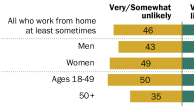
Workers who suffered a spell of unemployment during Great Recession are, on average, less satisfied with their new jobs than workers who didn’t. They are more likely to consider themselves over-qualified for their current position.
And six-in-ten say they changed careers or seriously thought about it while they were unemployed, according to a recent survey from the Pew Research Center’s Social & Demographic Trends project.
An estimated 26% (or 36 million) of the 139 million currently employed workers in the United States suffered at least one spell of unemployment during the Great Recession that began in December, 2007.
These “re-employed workers” have a complicated mix of attitudes about their new job, according to a nationally representative survey of 2,967 conducted from May 11 to May 31, 2010.

Only 38% of the re-employed say they are being paid more now than at their former job and just 28% say their current benefits are better. At the same time, however, a plurality of the re-employed (43%) say overall their new job is better than their old one-perhaps reflecting a sense of relief at being back at work after a spell of unemployment.
These judgments differ by how long the worker was unemployed. More than half (53%) of those who were out of work for less than six months say their current job is better than their old one compared with 36% of those who were unemployed six months or longer.

Overall, nearly eight-in-ten re-employed workers say they are satisfied with their current job. But the job satisfaction share is even higher-89%-among workers who did not suffer a spell of unemployment during the recession.
Moreover, the reemployed are more likely to feel overqualified for their current position than those who did not lose a job (54% vs. 36%).
The Great Recession has been a financial and emotional roller coaster ride for the re-employed.
A majority of the re-employed (55%) report their family is worse off financially now than before the recession started. More than a third (35%) report they have had to make major changes in their lifestyle because of the bad economy; by contrast, just 20% of Americans who didn’t lose their job during the recession say the same. While they were out of work, six-in-ten of the re-employed seriously thought about switching fields; four-in-ten considered moving to an area where jobs were more plentiful and nearly as many went back to school or enrolled in job-retraining.

While they differ in terms of their attitudes toward their present jobs, there are relatively few demographic differences between re-employed workers and those who did not lose their jobs during the recession. And for some workers, finding a new job was a short-lived victory over hard times. According to the survey, more than a third have suffered two or more spells of unemployment during the recession, including 16% who have been out of work three or more times.
Comparing Past, Present Jobs
According to the survey, somewhat less than half (45%) of re-employed workers lost a full-time job but then found full-time work during the recession. An additional 14% moved laterally from one part-time job to another.
At the same time, about one-in-eight re-employed workers (13%) moved from part-time to full-time employment. While the sample is too small to say with certainty, this group of new full-time workers is dominated by young people, suggesting that many may have gotten their first “real” job. But for one-in-four re-employed workers, the recession likely marks a backward step in their careers. Fully 26% of re-employed workers used to have a full-time job and now work part time.

Employed workers who had been out of work during the recession are somewhat less satisfied with their present jobs than their colleagues who were not unemployed during the recession. Nearly 78% of all workers who lost a job during the downturn say they are satisfied with their current job. That is 11 percentage points lower than the satisfaction levels of workers who did not experience a spell of unemployment.
Nor do the re-employed get the same sense of fulfillment from their current jobs as their colleagues who did not lose a job. About four-in-ten workers (39%) who experienced job loss during the recession say they get a sense of identity from their current position. For the remainder, their job is just what they do to put bread on the table. In contrast, more than half (52%) of all workers who did not lose their jobs during the recession get a sense of identity from their jobs.

Other findings in this survey suggest re-employed workers may have settled for the best-available job in an anemic job market. A majority of re-employed adults (54%) say they are overqualified for their current job, compared with 36% of other workers. Only a third report they have the right qualifications for their new job, more than 20 percentage points lower than the proportion of workers who did not lose their job.
Not surprisingly, among adults who lost a full-time job, those who found another full-time position are significantly more positive about their new job than those who accepted part-time employment (46% vs. 24%).
More than eight-in-ten (82%) full-time to full-time workers also say they are satisfied with their job (82%), nearly as high a job satisfaction level as among all workers. In contrast, about seven-in-ten (72%) workers who lost full-time jobs and now work part time are satisfied with their job.
Full-time to full-time workers also are more likely than part-timers to say they get a sense of identity from their current job (48% vs. 34%).
Career Changes
Many re-employed workers spent the time they were out of work reconsidering their job and career options. According to the survey, about four-in-ten re-employed workers (39%) say that when they were unemployed they moved or seriously considered moving to an area where jobs were more plentiful. About six-in-ten changed careers or contemplated doing so, while 36% sought job retraining programs or went back to school.
Taken together, the survey finds that three-quarters of all re-employed workers took one of the three steps or thought seriously about doing so — and nearly half (45%) at least did or considered doing two or more options.
Men and younger workers are significantly more likely than other workers to have contemplated making major changes in their working lives to get a job when they were out of work.
According to the survey, re-employed men are significantly more likely than re-employed women to say they seriously thought about moving or actually moved to a new area where jobs were more plentiful (45% vs. 31%). A somewhat larger share of these working men also report they had pursued a job retraining program or more formal education (39% vs. 33%) while unemployed. But the same share of men and women (60%) report that while they were unemployed, they changed careers or seriously thought about going into a new field.

Among re-employed workers ages 18 to 29, nearly half (47%) say they considered picking up stakes and moving to where the jobs were, compared with 22% of those ages 50 or older. Those age differences are not surprising in that young adults are the least likely to be married, have a family, own a house or have other characteristics that tend to keep people anchored in their current communities.
Among the re-employed, younger workers also are more likely than older adults to report having pursued job retraining or having sought more schooling to help them find a job (44% for those ages 18 to 29 vs. 26% for workers ages 50 or older).
Younger workers are less likely than the older re-employed to say they considered abandoning their occupations while they were jobless — perhaps because they have not yet chosen their life’s work. Overall, more than half (55%) of those ages 18 to 29 say they switched careers or seriously thought about doing so. That compares with 65% of those ages 30 to 49 and 62% who are ages 50 or older.

But what about those who found work after periods of unemployment? How good were the jobs they ultimately found? The survey suggests that reality roughly comports with the expectations of job seekers.
When the “re-employed” — those currently working who were unemployed sometime during the recession — were asked about their new jobs, striking differences emerged by the length that an individual was out of work.
Overall, about three-quarters of the re-employed say their current job is either better than their former job (43%) or about as good (30%). Only 24% say it’s worse.
But these results differ dramatically by duration of unemployment. By more than a three-to-one ratio, those out of work for less than six months say their new job is better than say it is worse (53% vs. 17%).
The verdict is more measured among those who were jobless six months or longer. Among this group, about three-in-ten (30%) say their new job is worse, while 36% say it is better and the remainder report it is about the same.
About the Data
Results for this survey are based on telephone interviews conducted with a nationally representative sample of 2,967 people ages 18 and older living in the continental United States. A combination of landline and cellular random digit dial (RDD) samples was used to represent all adults in the continental United States who have access to either a landline or cellular telephone. A total of 1,893 interviews were completed with respondents contacted by landline telephone and 1,074 with those contacted on their cellular phone. The data are weighted to produce a final sample that is representative of the general population of adults in the continental United States.
- Interviews conducted May 11-31, 2010
- 2,967 interviews, including 376 with adults working full- or part-time at the time of the survey who were unemployed at some point since the recession began in December, 2007.
- Margin of sampling error is plus or minus 2.2 percentage points for results based on the total sample at the 95% confidence level. Margin of sampling error for the sample of re-employed adults is plus or minus 6.7 percentage points.
- Survey interviews were conducted under the direction of Princeton Survey Research Associates International. Interviews Note on terminology: Whites include only non-Hispanic whites. Blacks include only non-Hispanic blacks. Hispanics are of any race. The terms “labor force” and “work force” are used interchangeably.
Read the full report for more details.




